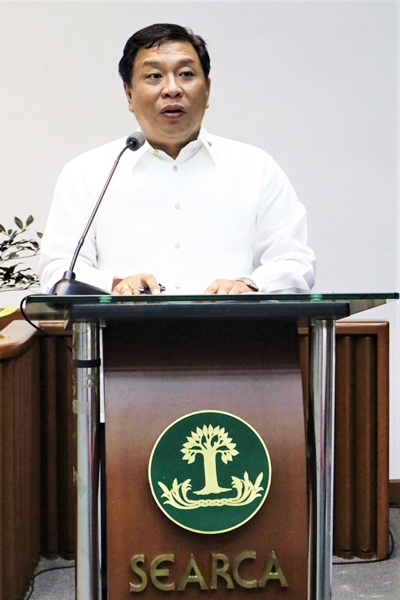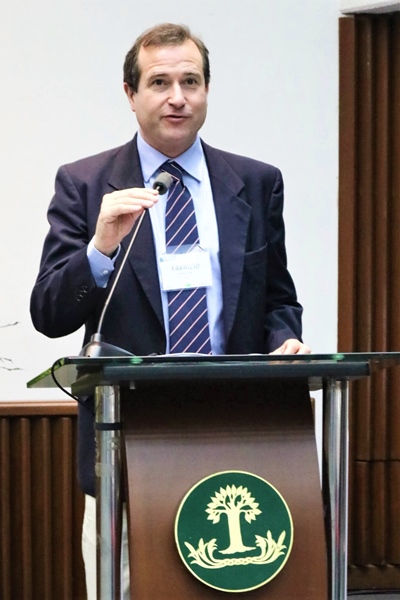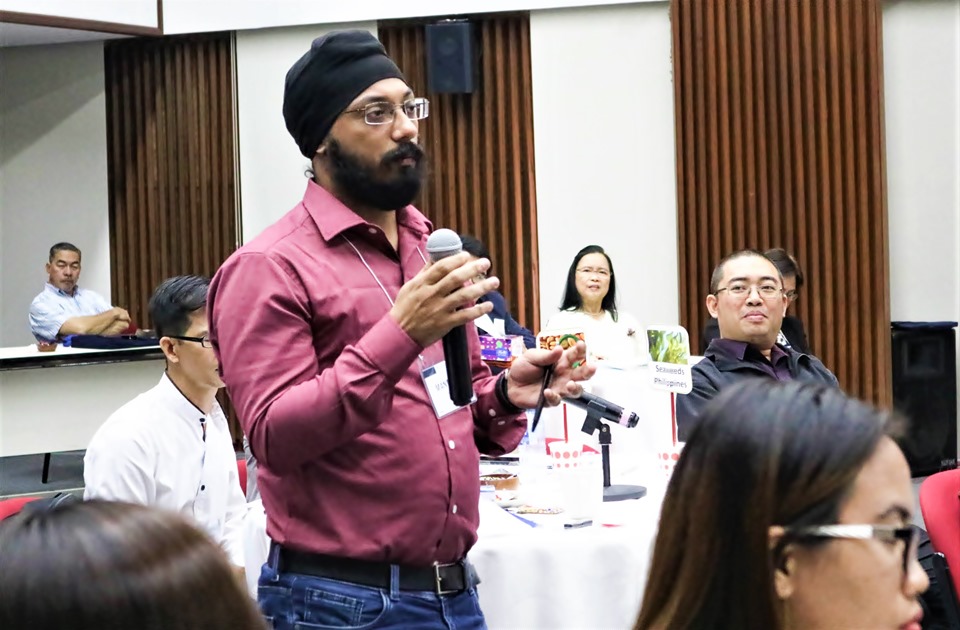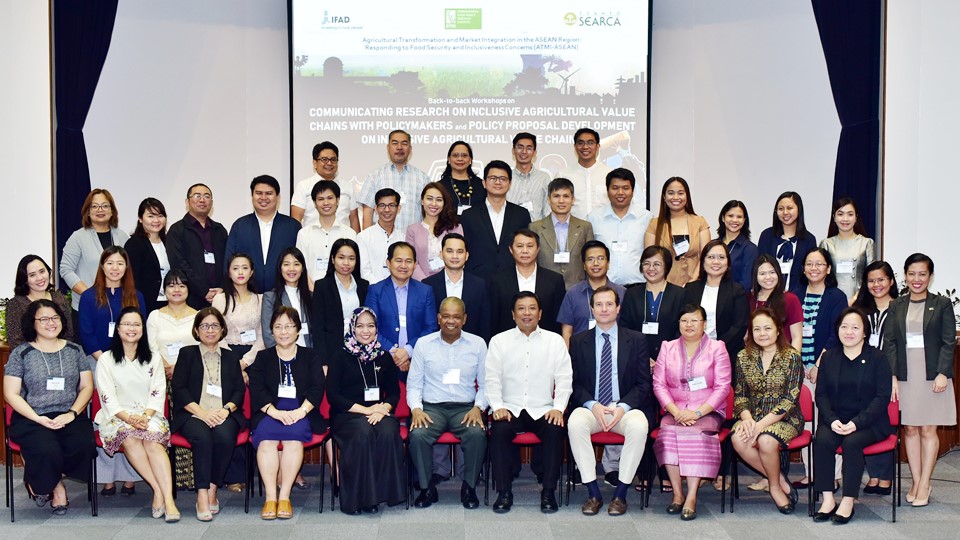The back-to-back workshops form part of the technical assistance for planning and development component of the Agricultural Transformation and Market Integration in the ASEAN Region: Responding to Food Security and Inclusiveness Concerns (ATMI-ASEAN) Project, which is jointly implemented by SEARCA and the International Food Policy Research Institute (IFPRI), and funded by the International Fund for Agricultural Development (IFAD). Initiated in 2016, the ATMI-ASEAN Project aims to strengthen the capacity of ASEAN member states in developing policies and programs to improve the state of smallholder farm sector vis-à-vis the agricultural transformation and market integration being driven by the ongoing ASEAN integration.
 Dr. Fernando C. Sanchez, Jr., Chair of the SEARCA Governing Board, highlights the vital role of communication in integrating evidence-based knowledge at each stage of the policy and decision-making process.The back-to-back workshops gathered 25 participants from Cambodia, Lao PDR, Myanmar, Vietnam, and the Philippines, consisting of ATMI-ASEAN research teams and focal agencies; and representatives from the Department of Agriculture and faculty members of state colleges and universities.
Dr. Fernando C. Sanchez, Jr., Chair of the SEARCA Governing Board, highlights the vital role of communication in integrating evidence-based knowledge at each stage of the policy and decision-making process.The back-to-back workshops gathered 25 participants from Cambodia, Lao PDR, Myanmar, Vietnam, and the Philippines, consisting of ATMI-ASEAN research teams and focal agencies; and representatives from the Department of Agriculture and faculty members of state colleges and universities.
In his welcome remarks, Dr. Fernando C. Sanchez, Jr., Chancellor, University of the Philippines Los Baños (UPLB) and Chair of the SEARCA Governing Board, said that amid challenges in institutionalizing agricultural policies and programs that are responsive to the needs of smallholders, re-examining and developing relevant national and regional policies and programs is only but half of the process. He emphasized the crucial role of communication at all stages of the policy making process, especially in ensuring that evidence-based knowledge is well integrated into policy and decision-making.
 Dr. Fabrizio Bresciani, Lead Regional Economist for the Asia and Pacific Division of IFAD, emphasizing the significance of the smallholder farm sector amid the shifting agricultural food systems in Southeast Asia.Dr. Fabrizio Bresciani, Lead Regional Economist of the Asia Pacific Division of IFAD, framed the workshop within the context of the current shift in agricultural food systems in Southeast Asia being ushered in by the ASEAN integration. He said that smallholders are key players in this transformation, especially since the process of change is different from what occurred in the 70s and 80s, where the focus was on improving productivity. According to Dr. Bresciani, increased commercialization and the resulting marginalization of smallholders generate the need for partnership among stakeholders, including the private sector, and for communicating the complexities of the transformation process and the solutions to emerging problems to policymakers.
Dr. Fabrizio Bresciani, Lead Regional Economist for the Asia and Pacific Division of IFAD, emphasizing the significance of the smallholder farm sector amid the shifting agricultural food systems in Southeast Asia.Dr. Fabrizio Bresciani, Lead Regional Economist of the Asia Pacific Division of IFAD, framed the workshop within the context of the current shift in agricultural food systems in Southeast Asia being ushered in by the ASEAN integration. He said that smallholders are key players in this transformation, especially since the process of change is different from what occurred in the 70s and 80s, where the focus was on improving productivity. According to Dr. Bresciani, increased commercialization and the resulting marginalization of smallholders generate the need for partnership among stakeholders, including the private sector, and for communicating the complexities of the transformation process and the solutions to emerging problems to policymakers.
The workshop on communicating research with policy makers featured activities aimed at enhancing the capacity of participants in developing effective and evidence-based communication materials and strategies to inform and guide policy decisions. This workshop consisted of modules on the roles of communication in various stages of the policy making process; understanding the mindset and information needs of policy makers; overview of policy advocacy; approaches and techniques on doing policy advocacy; and preparing and writing policy briefs. Dr. Cleofe S. Torres, Professor at the College of Development Communication, UPLB, served as the technical coordinator for this workshop.
Meanwhile, the workshop on policy proposal development on inclusive agricultural value chains tackled developing policies and interventions to promote smallholder participation in sub-regional agricultural and food markets and to enhance cooperation in food security and agricultural development in Southeast Asia. The workshop consisted of modules on policy development and formulation overview; structuring a policy problem; forecasting policy futures; prescribing preferred policies; and guidelines in writing policy proposals. Technical coordination for this workshop was led by Dr. Agnes Rola, newly retired Professor at the College of Public Affairs and Development, UPLB. (Christian Ray Buendia)
 Mr. Manmeet Ajmani, Research Analyst, IFPRI-New Delhi, asking for some pointers on how to package research reports ideal for the needs and mindsets of policymakers during the open forum of the back-to-back workshops.
Mr. Manmeet Ajmani, Research Analyst, IFPRI-New Delhi, asking for some pointers on how to package research reports ideal for the needs and mindsets of policymakers during the open forum of the back-to-back workshops.
